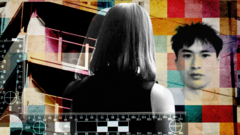Zhenhao Zou, a Chinese PhD student recently convicted of drugging and sexually assaulting ten women in London, has now seen twenty-three additional women file police reports against him. The authorities suspect that the number of his victims could be even higher, with indications that Zou may have filmed himself instrumental in committing crimes against approximately 50 women across two continents.
Policing teams have solicited these new claimants to come forward while urging a reconsideration of the broader implications surrounding the victimization of foreign nationals. Two women recently shared their harrowing experiences with the BBC, illustrating the psychological turmoil they faced, alongside fears of repercussions that prevented them from reporting sooner.
One victim, referred to as Alice, described her encounter with Zou in London, where he served drinks laced with drugs, rendering her unable to resist his actions. With both women expressing a sense of guilt for not reporting sooner, they emphasized the tragic burden of knowing multiple individuals suffered the same fate after them.
Alice met Zou during a night out with friends, and after being persuaded to drink from a bottle Zou had separate from the rest, she quickly succumbed to its effects. In a distressing turn of events, Alice awakened to find Zou filming himself sexually assaulting her. She ultimately fled his apartment after threatening to call for help.
The narrative surrounding Zou complicates further as Sarah Yeh of the Southeast and East Asian Women’s Association pointed out. Victims from abroad often encounter additional hurdles when navigating foreign legal frameworks, leaving them without the resources or awareness needed to seek justice.
Following Alice’s story, another victim, Rachel, recounted a similar ordeal where she was drugged and raped in Zou's hometown in China. She expressed doubts about her case’s viability in court, fearing cultural judgment if her family discovered her situation. Rachel and others are now advocating for more massacre victims of Zou to step forward and for better support systems to be available for those affected by sexual violence.
Many in Zou’s social circle, including a male friend, had suspected his actions were predatory, raising questions about complicity and accountability among those who witnessed or encountered his behavior without reporting it. As Alice reflected on her case, she realized she had held back for too long due to uncertainty regarding evidence and the belief that others might disbelieve her story.
Two original victims identified ahead of Zou's trial, Beth and Clara, disclosed important details of their encounters with Zou, emphasizing that sexual violence awareness must be prioritized within both international and local communities. Their collaboration in reporting Zou opened an avenue to justice, resulting in police re-evaluating the initial handling of their cases and expressing regret for how their allegations were managed.
As investigations proceed, Beijing authorities are also involved, shedding light on the necessity for cross-border cooperation in addressing sexual violence. The Metropolitan Police are determined to ensure that the numerous women coming forward will not only be heard but will receive fair treatment as their cases move forward. This unfolding situation highlights a pressing need for more effective support mechanisms for victims, especially those from diverse backgrounds who may fear misunderstanding or stigma.


















